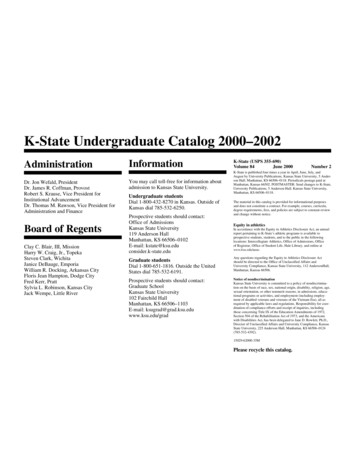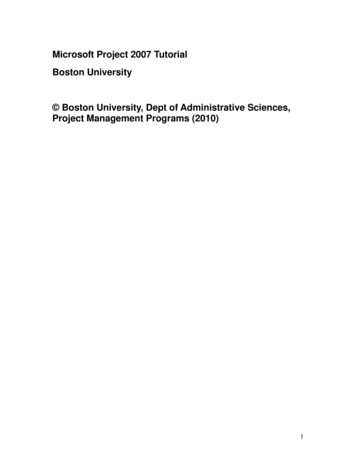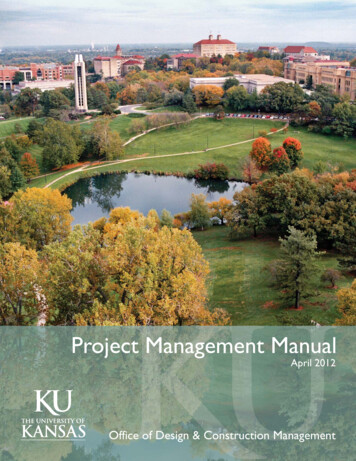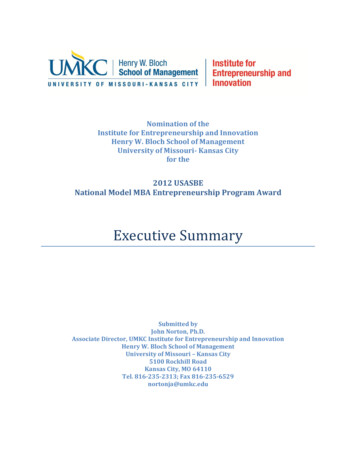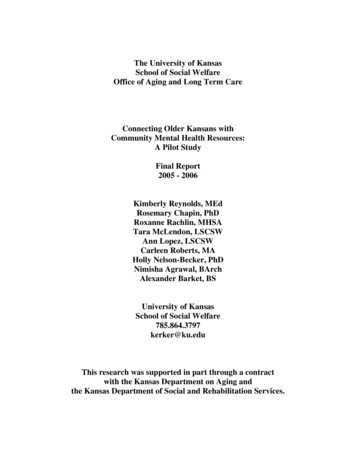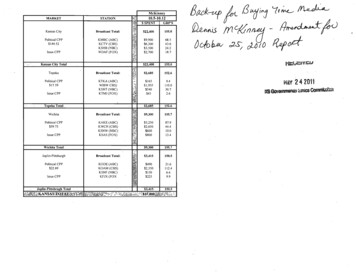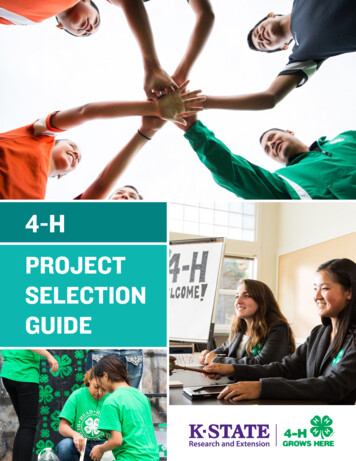
Transcription
4-HPROJECTSELECTIONGUIDE
Exploring your interests through 4-H project work isan excellent way to discover new skills and potentialcareers. While projects can vary depending on yourlocal program and availability, this guide offersa starting point for each of the official state 4-Hprojects. Resources for each project can be orderedthrough your county or district extension office.Enjoy your 4-H project experience!BeefLearn about raising, caring for and managing beef cattle as youstart with a bucket calf and work toward building your own herd.You’ll learn about different breeds and anatomy of beef cattle;how to feed, groom and show your animal; how to judge beefcattle for market and/or breeding; how to produce high-qualitybeef; and how to use data and technology in an efficient beefcattle operation.Beef Bucket CalfThis project is open to 7- to 12-year-olds. Calves may be purchased ororphaned but are to be bottle/bucket fed.Market BeefSelect, raise and show a market steer or heifer.Breeding BeefSelect, raise and show a breeding heifer. Learn the value of performancedata to make breeding decisions.Learning by DoingExhibit at local beef shows, State 4-H Livestock Sweepstakes,(includes livestock judging, quiz bowl, Skillathon, and meatsjudging), Kansas State Fair State Beef Show, and the Kansas JuniorLivestock Show.CitizenshipTake an active role in your community, country and world whilelearning about yourself and those around you. This project willencourage you to meet people and work with groups whilelearning about local, state and national governments. You alsocan make new friends from other countries and cultures throughexchange programs.Learning by DoingVolunteer in your community; attend Citizenship in Action inTopeka; attend Citizenship Washington Focus in Washington, D.C.;participate in exchange trips or host youth from another country.Clothing and TextilesLearn to create and sew your own clothing and accessories whileexploring the world of fashion in Clothing Construction. Or,develop your sense of style and value through Buymanship. Theseprojects build your confidence in managing your wardrobe ormay launch a career in fashion.Clothing ConstructionThe clothing construction project will teach you the basics, such assewing a shirt or putting in a zipper. Learn to select appropriate fabrics,use patterns, sew quality seams and care for your garments. In advancedunits, you can learn how to take the design of your choice and customizeit for the perfect look, color and fit.BuymanshipBuymanship will help you understand your wardrobe; plan a clothingbudget; select colors and styles that complement your body shape,proportion and balance; choose different shades of colors; comparefiber, care requirements, cost, brand and style; and analyze clothingadvertisements.Learning by DoingMake fair exhibits; make items for community service; participatein Fashion Revue to model clothing construction or buymanshipitems.Communications4-H is famous for helping youth improve their communicationskills. Being a better speaker, writer or record keeper will helpyou throughout your life. The communications project willhelp you interpret verbal and nonverbal information, developeffective public speaking skills, enhance written and spokencommunication, defend a point, design a presentation, and more.Learning by DoingDiscuss your other 4-H projects in an illustrated talk ordemonstration to club members, write a thank-you note, run for aclub office, complete a record book, or present a speech.Dairy CattleLearn about raising and managing dairy animals by selecting,grooming and showing a heifer calf or yearling heifer. Along theway, you’ll learn about dairy cattle breeds and anatomy, judgingand presenting oral reasons, animal health and welfare, andsafe practices for handling milk and milk products. Memberswith mature cows learn about animal feeds and nutrition, milkproduction, and careers in the dairy industry. Specific projectsinclude dairy bucket calf, dairy heifer and dairy cow.Learning by DoingParticipate in Kansas All-Breeds Junior Dairy Show, JudgingContest, Skillathon and Dairy Quiz Bowl.Dairy GoatsThe dairy goat project is great for smaller properties since goatsare typically easy to train and handle. Goat milk can be consumedby the family, fed to bucket calves or fed to other market animals.You might start with one doe, raise kids and eventually createyour own dairy goat herd. Throughout the project, you can learnabout breeds and anatomy of dairy goats, proper care and welfareof animals, record keeping and more.Learning by DoingParticipate in local and state dairy goat shows or join a regionaldairy goat organization.
Dog Care and TrainingWhether you have a dog or hope to own one, this project willhelp you learn more about your family’s best friend, from basiccare and grooming to advanced training commands. Learn aboutdifferent dog breeds and choose the best breeds for your family.Explore dog behavior, body language and obedience trainingwhile learning about proper nutrition to keep your dog happyand healthy.Learning by DoingShow your dog at local shows and the Kansas State Fair 4-H DogShow. Members without dogs may participate in quiz bowls andother activities that do not require dog ownership, such as theKansas 4-H Dog Conference.Energy ManagementThrough the Electric/Electronics, Small Engines and Power of theWind projects, you will begin to grasp how we power the worldtoday, as well as think about how to meet future energy needs.Electric/ElectronicsLearn general electrical concepts as you experiment with making lightswitches and circuits, test voltages and even build motors. Study energyuse, magnetism, electronics and transistors. Later, you can determineyour family’s electrical usage; measure electric usage of appliances; testgrounded outlets; explore electronics; build simple radios, microphones,computers and other equipment; and explore careers in electronics andengineering.Small EnginesLearn how small engines work as well as how to service them safely.You’ll start by learning the parts and cycles of engines and exploring theimportance of clean air to an efficiently running engine. Later, you willlearn to troubleshoot, repair and rebuild an engine; understand rulesand regulations for small engines; and explore starting a small enginebusiness or career.Power of the WindLearn how wind can be used for sailing, lifting, pumping water andcreating electricity. You’ll get to design and build a wind-powered boatand wind turbines; discover where and why the wind blows; and explorethe wind in art and literature.EntomologyIf you’ve ever chased butterflies, caught a ladybug for a closerlook or started a bug collection, the entomology project may be agreat fit. You’ll learn the anatomy of an insect; make an insect net;and collect, pin, label and exhibit an insect collection. Later, you’llstudy how insects move, learn about insecticides and exploreinsect behavior.Learning by DoingPlant a butterfly garden, catch and observe a spider in its web,conduct an insect survey and start an insect collection for exhibitat the fair.Environmental ScienceOur growing environmental science curriculum helps you notonly learn about your environment, but also explore ecosystems;understand conservation; learn how water can be responsiblypreserved, protected, used and reused; expand recycling efforts;and understand your ecological footprint.Learning by DoingOrganize a park, highway, or waterway cleanup; research anenvironmental topic of your choice and make a video or do aproject talk; locate credible research on climate change to decidewhat you believe and why.Exploring 4-HThis project is for first- and second-year members. It’s a great wayto explore 4-H projects without officially committing. Memberswill be exposed to numerous project areas with the guidance ofolder members and adult volunteers.Family StudiesLearn about growing and maintaining a healthy family bylearning about child development, building family strengths andmanaging a household.Child DevelopmentLearn how children grow and develop physically, socially, mentallyand emotionally. Observe how people express emotions, identifycharacteristics of friends, learn socially accepted manners and customs,and observe child behavior.FamilyLearn behaviors that develop friendships, develop respect for othersand their belongings, understand the need for rules; express feelings ina positive way, cope with change and stress, learn physical changes ofadolescence, study the effects of employment on family and lifestyle, andlearn to use consensus and compromise.Consumer SkillsResponsible financial management is an important factor in successfulfamilies. Learn to determine differences between needs and wants,develop a savings plan for a specific goal, practice comparison shopping,learn to manage a checking account, recognize target advertising,identify consumer rights and learn the value of employment.Learning by DoingPartner with a peer to explore and discover solutions to today’sconsumer topics, create an intergenerational community-serviceproject, and establish a baby-sitting service.Fiber ArtsIf you’ve ever wondered how to crochet a scarf, embroider apillowcase or make a quit, this project can help you learn theseskills and more. Fiber Arts focuses on skills passed down throughgenerations to provide basic family needs, such as apparel, homefurnishings and decorations.CrochetLearn single crochet, double crochet and many other stitches; advance tohairpin lace.KnittingLearn casting on, knit and purl stitches.Needle ArtsLearn embroidery, cross-stitch, needlepoint, candle wicking, crewel,lacework and applique techniques.Patchwork and QuilitingLearn to stitch, tie and design quilts.
Rug MakingCreate latch hook and braided rugs.SpinningMake a hand spindle or prepare wool fibers.WeavingLearn parts of a loom or figure yarn needs for items.Ethnic ArtsLearn textile art methods from different cultures that have been passedon throughout history.MacraméCreate ornamental knotting; learn terms, tools, techniques and cords.Learning by DoingCreate items for fair exhibits or to donate to hospitals, shelters ornursing homes.Foods and NutritionIn this project, you will have fun learning how to cook the basicsand then advance to gourmet and international meals. Developbaking skills, learn about food preservation, explore the heritageof many foods and understand consumer buying skills. Learn howto make healthy snacks and modify recipes to fit a healthy lifestyle.Learning by DoingEnter a foods exhibit in the fair, plan and prepare snacks and mealsfor your family, incorporate exercise into daily life, and learn aboutfood safety through activities like working in a club concessionstand.GeologyIf you enjoy learning about interesting rocks or fossils, then diginto this project. Discover the types of minerals, rocks and fossilsin your area and other geological formations across Kansas and inother states.Learning by DoingGeology field trips to various Kansas locations and collect, identifyand display specimens.Health and WellnessHealth, exercise and recreation are vital parts of your daily lives. Inthese projects you can focus on physical activity, healthy eating,exercise, sports and recreation, or first aid.BicycleLearn and practice bicycle safety, identify parts of a bicycle, learn bicyclemaintenance and repair, and practice safe riding at night and in adverseconditions.HealthLearn basic first aid and create your own first aid kit; learn to choosenutrient-rich “power foods” for snacks; learn how to improve personalstrength, flexibility and endurance; and design your personal fitness plan.Outdoor RecreationGo enjoy the great outdoors. Learn about hiking, camping, finding shelterand backpacking; observe and care for nature; find your way using acompass, GPS, or landmarks. Apply the “Leave No Trace” ethic whenbackpacking and hiking.AdventuresLearn about different types of recreation identify personal areas ofstrength; and learn the benefits of recreation for your body and mind.Home EnvironmentInterior design is all about making a house into a home. Thisproject will help you experiment with colors, textures, light, soundand space to create the perfect feeling. You also can explore acareer in interior design.Learning by DoingPlan a room makeover, visit a design center and interview aninterior designer.HorsesIf you love horses and want to learn how to safely handle, careand ride a horse that you own or lease at least 75 percent of thetime the horse project is for you. In this project you will learnbasic coat colors, breeds and horse anatomy; study horse health;participate in judging contests, quiz bowl and hippology; andgive presentations. If you want to exhibit a horse in the DistrictShow or State Fair, Achievement Level I is required to participate.Achievement Level I focuses on safe handling of horses. Thenonce completed Achievement Level I, Achievement Levels II, III,and IV can be taken to advance your educational knowledgeof horses. 4-H Horse Identifications are due May 1 into the localExtension Office.Learning by DoingVisit a stable or farm; participate in the State Horse JudgingContest, State Horse Quiz Bowl, Horse Panorama, horsepresentations and hippology; and exhibit at district and statehorse shows.Horseless HorseIf you love horses and do not own or lease a horse then theHorseless Horse project is for you. In this project, you canlearn about horses, participate in judging contests, quiz bowl,hippology, give presentations, and can assist another 4-Hmember at horse shows and trail rides. In the Horseless Horseproject a borrowed 4-H Identified horse can be shown locally inshowmanship, only.Learning by DoingVisit a stable or farm; participate in the State Horse JudgingContest, State Horse Quiz Bowl, Horse Panorama, horsepresentations and hippology; and attend district and state horseshows.LeadershipLearn what it takes to be a leader through skills includingunderstanding yourself, considering others’ feelings, beingresponsible, communicating, making decisions, and managingand working with groups.Learning by DoingJoin a Gavel Games team to run a meeting; volunteer fora committee; chair a committee; run for an office; attendCampference or the Kansas Youth Leadership Forum.
Meat GoatsThe 4-H Meat Goat project is quickly growing as demandincreases for meat products. You’ll learn how to select, raise andcare for a meat goat; study breeds and anatomy; learn how to fitand show meat goats; recognize diseases; keep records; selectbreeding stock; learn key components in developing a goat herd;and evaluate feed ingredients.Learning by DoingParticipate in Meat Goat Day at K-State, Livestock Sweepstakes,Kansas Junior Livestock Show and the State Meat Goat Show atthe Kansas State Fair.Performing ArtsThose who enjoy being in the spotlight on stage or being creativeoff stage may enjoy this project. Learn to express yourself in frontof a crowd.Learning by DoingExpress yourself by creating and presenting a theatrical play ormusical performance; participate in camp’s talent show, create apuppet show; create costumes, sets and props; and enter yourlocal Club Days or other contests.PetsWhether you love fish, hamster or cats or other pets, theseprojects can help you learn more about your household friendsand what different pet species need to stay healthy.PetsIdentify hazards for pets around your home, and learn about your pet’sfeeding and care. Learn the symptoms and treatment of diseases as wellas taxonomic classification.CatsLearn how to choose a cat, practice cat grooming techniques, study catsenses, begin to understand cat behavior, study cat diseases affectingpeople and learn about cat genetics.Learning by DoingDesign a toy for your pet; create a commercial or a pet storescavenger hunt.PhotographyCapture your friends, family and important events throughphotography.Level 1Learn how a camera works, basic photo composition, organize a photostory and how to use a simple camera.Level 2Learn shutter speeds and f-stops, the Rule of Thirds, and how to capture apoint in time.Level 3Use filters and a light meter and create still-life photos. See the differencesbetween normal, wide angle, telephoto and zoom lenses.Learning by DoingDocument your family or club activities through photos; entera photo contest or fair exhibit; enter the photography judgingcontest at the Kansas State Fair.Plant SciencePlant Science projects focus on raising a garden, growingflowers, forestry and field crops. This includes planning, planting,experimenting, understanding soils, seeds, insects, plantcare, harvesting, weed identification and control, processing,exploring careers, and the relationship between trees, people andcommunities.HorticultureLearn when, where and what to plant; learn the difference between cooland warm-season vegetables; learn plant parts and how they are used;learn how to use basic garden tools; study seed varieties and startingseeds indoors; study preventative pest controls; learn about specialtyharvests and selling your produce; study plant pollinations; study foodindustry careers; and learn about biotechnology.Field CropsExperiment with soil testing, grow and harvest crops, plant a wheatvariety test plot, and learn about herbicides and fertilizers.ForestryLearn to identify trees, determine differences between trees and shrubs,learn about different trees and tree parts, graft a bud to a living tree,discover health benefits of trees, investigate forest changes and learnabout forest health and learn forest conservation techniques.Learning by DoingParticipate in the Kansas 4-H State Wheat Expo; CropsIdentification Contest at the Kansas State Fair; and HorticultureJudging Contest.PoultryThis project is designed to help you learn about chickens andother poultry. You will learn poultry breeds and anatomy and howto care for and handle your birds. Learn how eggs are formed,how to select and judge broilers, make an egg candler, peckingorders; lead younger members in egg experiments; processchickens for food; and learn about biotechnology and poultrycareers.Learning by DoingParticipate in the Poultry Judging Contest at the Kansas State Fair.RabbitsThe rabbit project will allow you to learn to raise and care for yourrabbits. Identify main breeds of rabbits and their anatomy, learnfeeding and watering practices, learn to groom and show a rabbit,and care for newborn rabbits. It is best to enroll in the fall toprepare for receiving your first rabbit.Learning by DoingJoin a 4-H Rabbit Judging Team; start with a doe and grow yourproject by selling rabbits.ReadingThis project encourages you to harness your love of reading tolearn more abvout your 4-H projects, research new topics orentertain yourself. As Dr. Seuss wrote, “The more that you read,
the more things you will know. The more that you learn, the moreplaces you’ll go.”Learning by DoingGet a library card for your local public library, share a book reviewwith others, and read with younger kids at an elementary schoolor after-school program.Self-DeterminedThe self-determined project is just that—you decide what youdo or study. Is there something you have a passion for that isnot listed? This is your opportunity to create your own project.Research a sport, hobby or career—the sky is the limit.Learning by DoingIdentify and pursue a personal passion or interest; set goals andevaluate the completion of your goals; and share your hobby,interest or activity with others.SheepIn this project, 4-H members can enroll in either market orbreeding. Throughout your 4-H years, you will learn to identifysheep breeds and anatomy, manage and train sheep for show,learn safety and management practices for maintaining a flock,identify symptoms and treatment of diseases, study nutritionalrequirements, study technology’s impact on sheep production,and explore career opportunities in the sheep industry.Market LambSelect, raise and show a market lamb; member must obtain ownership ofthe animal; market ewes should not be returned to a breeding flock.Breeding SheepSelect, raise and show a breeding ewe or purchase a flock of breedingewes.Learning by DoingExhibit at a local sheep show the Livestock Sweepstakes, or KansasJunior Livestock Show.Shooting SportsIf you want to learn to shoot an air rifle, shotgun or bow andarrow, you should check out the 4-H shooting sports project. Thisproject teaches gun safety, care and safety of shooting sportsequipment, hunting practices, and provides an opportunity totest your skills. To participate, youth must be 8 years of age as ofJanuary 1 of the current year.Check with your county or district extension office about acertified program. Local certified shooting sports coordinatorsand instructors are required for each discipline. Disciplines includeBB gun, air rifle, air pistol, archery, shotgun, hunting skills, muzzleloading, small bore rifle, small bore pistol, and western heritage.Learning by DoingDemonstrate safe use of air rifle, shotgun, bow, etc., throughpractice, talks, demonstrations and exhibits. Exhibit shootingsports skills at local and district events. State matches for thedifferent disciplines are held in the fall and spring, or participate inthe Instructors Junior Apprentice Training Program (ages 14 andolder).Space TechBuild model rockets, robots and explore space with telescopes.Discover the world of unmanned aerial systems, to safely andlegally fly a drone. Learn about computers and how to repairnetwork devices. SpaceTech projects offer you the thrill ofexploring the field of science and technology.Rocketry/AerospaceDiscover how a model rocket works, study equipment and procedures fora safe launch, build and launch your own model rockets.AstronomyStudy the different kinds and uses of telescopes, build a simpletelescope, learn planet order by making a key ring bead system, buildspectroscopes, distort light with lenses and prisms, and how to set uppublic viewings.RoboticsLearn about robot arms, legs, wheels or under-water propulsion; exploresensors, analog and digital systems; build basic circuits; design a robot;and program a robot to do a task.Unmanned Aerial SystemsExplore the world from above the trees and discover new frontiers withUnmanned Aerial Systems (UAS). This project provides the opportunityto safely expand your understanding of UAS and the world around them.You can explore the uses and applications of UAS, including how they linkto other projects such as geology, robotics, electronics, crop science andmore.ComputersLearn the basic components of a computer; identify the similaritiesand differences in office software applications; learn Internet safety.As you get older, learn to build, maintain and re-pair computers. Learnprogramming languages and network security.Learning by DoingTeach your new SpaceTech skills to others; launch a rocket; build arobot and enter it at the county and state fair.SwineIf you want to learn about raising, caring for and managing amarket or breeding hog, enroll in the swine project where youwill study pork production from farrow to finish. Throughout theproject you will identify different swine breeds and anatomy;types of feeds; identify symptoms, causes, and treatments ofswine diseases; study breeding systems and performance data;and explore career opportunities in the swine industry.Market SwineSelect, raise and show a market hog.Breeding SwineSelect, raise and show a breeding gilt. As you grow in the project, youmight manage your own breeding herd and sell market hogs to others.Learning by DoingExhibit at a local swine show or participate in K-State’s YouthSwine Day; Kansas Junior Livestock Show; or the Kansas State FairSwine Show.
Visual ArtsEncourage your creative skills in learning how to draw, paint andwork with different media. Explore art techniques, study art historyand culture, or challenge yourself to discover new artistic talents.The visual arts project teaches artistic skills and the elements andprinciples of design. Projects include ceramics, leather and more,depending on your local 4-H program.Learning by DoingPractice drawing, painting and printing techniques in paint,pencil, chalk, charcoal or mixed media; learn sculpture techniques;make something from wood, leather, paper or clay; weave abasket or wall hanging; etch glass or metal; make jewelry and wiresculptures; create mosaics or nature crafts; discover new media.Enter your best work in the fair and teach others the new skillsyou’ve learned.WildlifeKansas wildlife is an important part of the state’s heritage andenvironment, ranging from buffalo to birds and fish to deer. In thisproject you’ll learn about wildlife behavior, habitat requirements,how wildlife species fit into nature’s scheme, how they aremanaged and how they relate to humans. Some local units alsooffer sport fishing as an additional project.Learning by DoingEnter a sport fishing contest; create wildlife habitat; participatein the Hunting, Fishing and Fur Harvesting School; and enter theWildlife Habitat Evaluation Contest.WoodworkingWhether you want to build a bookshelf or a whole house, you’llneed similar skills, tools, fasteners and joints. In this project you’lllearn how to accurately measure and mark boards, use varioustools, safety practices, identify types of lumber, and select woodbased on grain. As you get older, you’ll learn to use power tools,discover technology in tools and explore career opportunities.Learning by DoingSelect and build an item to exhibit at the fair; use your new skillsto volunteer or help a neighbor; and teach others something youlearn in the woodworking project.Brand names appearing in this publication are for product identification purposes only. Noendorsement is intended, nor is criticism implied of similar products not mentioned.Publications from Kansas State University are available at www.ksre.ksu.eduPublications are reviewed or revised annually by appropriate faculty to reflect current research andpractice. Date shown is that of publication or last revision. Contents of this publication may befreely reproduced for educational purposes. All other rights reserved. In each case, credit the authors,Publication Title, Kansas State University, Month Year.Kansas State University Agricultural Experiment Station and Cooperative Extension Service4H1065K-State Research and Extension is an equal opportunity provider and employer. Issued infurtherance of Cooperative Extension Work, Acts of May 8 and June 30, 1914, as amended. KansasState University, County Extension Councils, Extension Districts, and United States Department ofAgriculture Cooperating, John D. Floros, Director.
Bicycle Learn and practice bicycle safety, identify parts of a bicycle, learn bicycle maintenance and repair, and practice safe riding at night and in adverse conditions. Health Learn basic first aid and create your own first aid kit; learn to choose nutrient-ric

